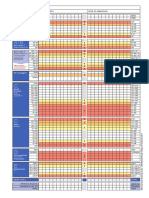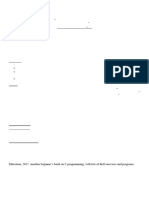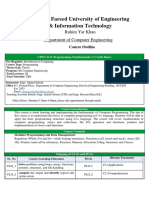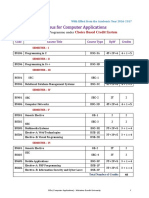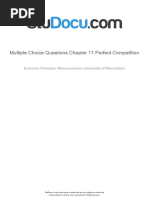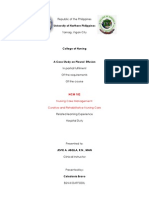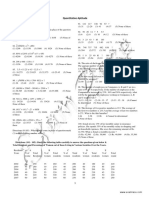0 ratings0% found this document useful (0 votes)
113 viewsProgramming Methodology I
This 3 credit course introduces programming methodology and data structures in C++. Students will learn basic C++ concepts like data types, arrays, pointers, structures, loops, functions, and recursion. Object oriented programming concepts like classes, inheritance, polymorphism will also be covered. Common data structures like lists, stacks, and queues will be introduced. The course has homework, quizzes, midterm exams and a final exam for assessment. There is an associated lab course for hands-on C++ programming experience.
Uploaded by
Obukohwo OkeCopyright
© © All Rights Reserved
Available Formats
Download as PDF, TXT or read online on Scribd
0 ratings0% found this document useful (0 votes)
113 viewsProgramming Methodology I
This 3 credit course introduces programming methodology and data structures in C++. Students will learn basic C++ concepts like data types, arrays, pointers, structures, loops, functions, and recursion. Object oriented programming concepts like classes, inheritance, polymorphism will also be covered. Common data structures like lists, stacks, and queues will be introduced. The course has homework, quizzes, midterm exams and a final exam for assessment. There is an associated lab course for hands-on C++ programming experience.
Uploaded by
Obukohwo OkeCopyright
© © All Rights Reserved
Available Formats
Download as PDF, TXT or read online on Scribd
You are on page 1/ 3
14:332:252 - Programming Methodology I
Course Catalog Description: 14:332:252 - Programming Methodology I (3)
Basics of programming and data structures in C++. Basic data types: arrays, pointers,
enumerations, structures. Basic programming structures: loops, functions, recursion. Object
oriented design: classes, inheritance, overloading, and polymorphism; Abstract Data Types: lists,
linked lists, stacks, and queues; Introduction to algorithm analysis: searching and sorting.
Pre-Requisite Courses: 14:440:127 or the equivalent
Co-Requisite Courses: 14:332:254 Programming Methodology I Laboratory
Pre-Requisite by Topic:
1. Concepts of loops, arrays, basic mathematical programming.
2. Knowledge of C++ or equivalent.
Textbook & Materials:
Deitel & Deitel, C++ How to Program (7th edition), Prentice Hall, 2009.
References: None
Overall Educational Objective:
To develop basic skills in efficient design of C++ algorithms and programming.
Course Learning Outcomes:
A student who successfully fulfills the course requirements will have demonstrated: a basic
knowledge of C++ design, implementation of simple C++ programs.
How Course Outcomes are Assessed:
• HW Problems (15 %)
• QUIZ (10%)
• Two Mid-Term Exams (50 %)
• Final Exam (25 %)
N = none S = Supportive H = highly related
Outcome Level Proficiency
assessed by
(a) an ability to apply knowledge of Mathematics, science, and H HW Problems,
engineering Exams
(b) an ability to design and conduct experiments and interpret data N
(c) an ability to design a system, component or process to meet N
desired needs within realistic constraints such as economic,
environmental, social, political, ethical, health and safety,
manufacturability, and sustainability
(d) an ability to function as part of a multi-disciplinary team N
(e) an ability to identify, formulate, and solve ECE problems H HW Problems,
Exams
(f) an understanding of professional and ethical responsibility N
(g) an ability to communicate in written and oral form S HW Problems and
reports
(h) the broad education necessary to understand the impact of N
electrical and computer engineering solutions in a global, economic,
environmental, and societal context
(i) a recognition of the need for, and an ability to engage in life-long S Home-work, lecture
learning on advanced topics
(j) a knowledge of contemporary issues N
(k) an ability to use the techniques, skills, and modern engineering H HW Problems,
tools necessary for electrical and computer engineering practice Exams
Basic disciplines in Electrical Engineering N
Depth in Electrical Engineering N
Basic disciplines in Computer Engineering H HW Problems,
Exams
Depth in Computer Engineering S HW Problems,
Exams
Laboratory equipment and software tools H HW Problems, Mid-
Term Exams
Variety of instruction formats S Lecture, office hour
discussions, lab
lectures
Topics Covered week by week:
Week 1: Intro to C++, basic data types
Week 2: Control structures, looping
Week 3: Functions
Week 4: Arrays, 2D arrays
Week 5: Basic searching and sorting
Week 6: Pointers, dynamic memory allocation
Week 7: Structures, and linked lists
Week 8: Introduction to classes and object oriented design
Week 9: Basic class design
Week 10: Overloading
Week 11: Inheritance
Week 12: Polymorphism
Week 13: Abstract data types: lists
Week 14: Linked list, introduction to stacks and queues
Week 15: Standard Template Library (STL)
Week 16: Review and Final Exam
Computer Usage:
There is an associated lab course which requires C++ programming.
Laboratory Experiences:
There is an associated lab course which is a co-requisite.
Design Experiences:
Moderate design experience in constructing C++ programs as needed.
Independent Learning Experiences:
1. Homework in programming
Contribution to the Professional Component:
(a) College-level mathematics and basic sciences: 0.25 credit hours
(b) Engineering Topics (Science and/or Design): 2.75 credit hours
(c) General Education: 0 credit hours
Total credits: 3
Prepared by: Y. Zhang
Date: June 2011
You might also like
- NEWS2 Chart 3 - NEWS Observation Chart - 0 PDFNo ratings yetNEWS2 Chart 3 - NEWS Observation Chart - 0 PDF1 page
- 22 CS101 Problem Solving Using C++ Lab ManualNo ratings yet22 CS101 Problem Solving Using C++ Lab Manual54 pages
- 667474968_CS-109 Fundamentals of Programming-INo ratings yet667474968_CS-109 Fundamentals of Programming-I3 pages
- Semester Hours: Contact Hours: 3 Coordinator: Text: Author: YearNo ratings yetSemester Hours: Contact Hours: 3 Coordinator: Text: Author: Year4 pages
- PSC - Course Handout - CS1002 - August 2023No ratings yetPSC - Course Handout - CS1002 - August 20238 pages
- 0-CC1021 Programming Fundamentals Outline-V1 (Revised)No ratings yet0-CC1021 Programming Fundamentals Outline-V1 (Revised)6 pages
- EEB334 Computer Programming I Course Outline and Teaching Plan 2022No ratings yetEEB334 Computer Programming I Course Outline and Teaching Plan 20223 pages
- Programming in C (CSE18R153) : School of Computing Departement of Computer Science and EngineeringNo ratings yetProgramming in C (CSE18R153) : School of Computing Departement of Computer Science and Engineering14 pages
- CS F111 Computer Programming I Sem 2024-25 HONo ratings yetCS F111 Computer Programming I Sem 2024-25 HO5 pages
- Data Structure and Algorithms Lab Manuel in C++No ratings yetData Structure and Algorithms Lab Manuel in C++120 pages
- Programming in C (CSE18R153) : School of Computing Departement of Computer Science and EngineeringNo ratings yetProgramming in C (CSE18R153) : School of Computing Departement of Computer Science and Engineering14 pages
- Semester 1 Programming Fundamental - Course Outline - Spring 2023 (Finalized)No ratings yetSemester 1 Programming Fundamental - Course Outline - Spring 2023 (Finalized)6 pages
- Ec8381 Fundamentals of DS in C LaboratoryNo ratings yetEc8381 Fundamentals of DS in C Laboratory112 pages
- ADP (Computing) 1st Programming Fundamental OutlineNo ratings yetADP (Computing) 1st Programming Fundamental Outline7 pages
- NEP-B.Sc. (Computer Science) - Sem. I & II - (Syllabus)No ratings yetNEP-B.Sc. (Computer Science) - Sem. I & II - (Syllabus)17 pages
- Subject Outline - Data Structures and Algorithms - Autumn 2020 - UTSNo ratings yetSubject Outline - Data Structures and Algorithms - Autumn 2020 - UTS12 pages
- Khwaja Fareed University of Engineering & Information TechnologyNo ratings yetKhwaja Fareed University of Engineering & Information Technology3 pages
- Cosc - 1436 - Fall 16 - Dalia - Gumeel-CNo ratings yetCosc - 1436 - Fall 16 - Dalia - Gumeel-C6 pages
- Programming Fundamentals BSCS+BSSE-I Health Sciences Wing 2021 (1)No ratings yetProgramming Fundamentals BSCS+BSSE-I Health Sciences Wing 2021 (1)4 pages
- B.Tech I & II Semester Syllabus - 2018-19 PDFNo ratings yetB.Tech I & II Semester Syllabus - 2018-19 PDF41 pages
- CSE202 Object Oriented Programming 14307::raj Karan Singh 3.0 0.0 0.0 3.0 Courses With Numerical and Conceptual FocusNo ratings yetCSE202 Object Oriented Programming 14307::raj Karan Singh 3.0 0.0 0.0 3.0 Courses With Numerical and Conceptual Focus12 pages
- cs160 Programming and Problem Solving II l4No ratings yetcs160 Programming and Problem Solving II l43 pages
- Course Outline Introduction to ProgrammingNo ratings yetCourse Outline Introduction to Programming2 pages
- CSE 115 - 115L Course Objective and OutcomeNo ratings yetCSE 115 - 115L Course Objective and Outcome6 pages
- Teaching Research in Design: Guidelines for Integrating Scientific Standards in Design EducationFrom EverandTeaching Research in Design: Guidelines for Integrating Scientific Standards in Design EducationNo ratings yet
- Steps To Small Business Start-Up - Everything You Need To Know To Turn Your Idea Into A Successful Business (PDFDrive)No ratings yetSteps To Small Business Start-Up - Everything You Need To Know To Turn Your Idea Into A Successful Business (PDFDrive)274 pages
- Unit - 4 Artificial Intelligence AssignmentNo ratings yetUnit - 4 Artificial Intelligence Assignment13 pages
- Kenneth Foner - Getting A Quick Fix On ComonadsNo ratings yetKenneth Foner - Getting A Quick Fix On Comonads12 pages
- (Lionel Casson) Libraries in The Ancient WorldNo ratings yet(Lionel Casson) Libraries in The Ancient World190 pages
- Typhoon Yolanda: An Analysis On The Impact of Natural Disasters and Effectiveness of Disaster ManagementNo ratings yetTyphoon Yolanda: An Analysis On The Impact of Natural Disasters and Effectiveness of Disaster Management7 pages
- Multiple Choice Questions Chapter 11 Perfect CompetitionNo ratings yetMultiple Choice Questions Chapter 11 Perfect Competition26 pages
- Software Engineering: User Interface DesignNo ratings yetSoftware Engineering: User Interface Design14 pages
- Provisional Graduation List Website 04.10.24No ratings yetProvisional Graduation List Website 04.10.2442 pages
- Quantitative Aptitude Sample Paper 1 PDFNo ratings yetQuantitative Aptitude Sample Paper 1 PDF9 pages
